- Home
- Scott Westerfeld
Blue Noon m-3 Page 5
Blue Noon m-3 Read online
Page 5
Dess wondered how that math worked. If every generation of mindcasters took all their memories and forwarded them onto the next bunch, who then passed theirs onto the next, who added their memories, and so on… wouldn’t the pile get too big at some point? Wouldn’t all that knowledge become less and less stable, like building blocks stacked higher and higher, until the whole thing collapsed at once?
Maybe the memories got fuzzier as you went back in time, a blurry aggregate of thoughts and feelings, like the symbols that meteorologists used to represent weather. Dess imagined a big H hovering over Madeleine’s house, warning of a high-pressure center of bitchiness.
“Don’t rattle the cup when you stir, Jonathan!”
Speaking of which, Dess thought as Jonathan exchanged an eye roll with her. He kept stirring his tea, adopting a sarcastic little spoon twirl that Madeleine didn’t seem to notice.
At least they didn’t have to edit their thoughts here. Madeleine’s house was built on a whopping big crepuscular contortion, a wrinkle in the blue time that made it almost impossible to plunder anyone’s mind without physical contact. It was like living next to a power line that screwed up your TV reception.
This contortion was the only thing that had protected Madeleine for the last five decades. She was invisible to the darklings here, hidden along with her antiques and books, all the leftovers from the days when midnighters had ruled Bixby instead of skulking in the shadows.
Dess looked at the junk piled in the corners of the room, her mind automatically dissecting the angles of tridecagrams in rusted steel, all the patterns of thirteens and thirty-nines that had once guarded the town’s key citizens. Some of the junk was pretty interesting, engraved with old-timey tridecalogisms like accelerograph and paterfamilias. She had to admit: Rex and Melissa weren’t the only ones who’d found stuff to play with here.
Still, it bugged Dess that those two had gotten anything at all out of her discovery. Especially since the sweaty work of protecting Madeleine had been left to Dess, Jessica, and Jonathan. The three had spent hours making a big pile of the least-rusty darkling defenses. Then Dess had made sure every piece had its own brand-new thirteen-letter name and mounted them all around the house as a last line of protection should the darklings ever find Madeleine’s hiding place.
And what thanks had they gotten? Mostly getting yelled at for making too much noise.
“So, now that we all have tea,” Madeleine pronounced, “perhaps we should discuss the little incident this morning.”
“About time,” Dess muttered. Her fingers traced the deep scratches in the wood of the table. It had been completely covered by big, heavy iron tridecagrams before she’d cleared the room to make it habitable.
Madeleine arched an eyebrow. “Well, then, Desdemona. Since you’re feeling feisty, perhaps you’d like to start.”
“Me? What do I know about it? We were sort of hoping you could tell us something.”
“But surely you have something numerate to contribute?”
Dess sighed. “Well, we checked Rex’s fancy watch after the eclipse was over. He resets it every morning to the time on Geostationary, which is always perfect.” She felt the comforting weight of the GPS device in her pocket. “Turns out it had gained twenty-one minutes and thirty-six seconds—that was the total length of time the dark moon was up. That’s nine times 144 seconds, which is a very darkling number. Must mean something.”
“But you don’t know what?” Madeleine said.
“Not yet.” Dess sipped at her tea. Maybe the bitter taste of it would focus her mind on the problem.
“There’s nothing like this in the lore,” Rex piped up. “Not that I’ve read. You don’t have any old memories that would help, do you?”
Madeleine took a long while to respond, as if she was filtering out an answer from the centuries of thought echoes in her head. Voices in her head… That didn’t sound particularly sane. Maybe the weight of all those piled-up memories had driven Madeleine madder and madder as she’d hidden in this house, alone. Maybe what mindcasters really passed on was a trick for acting serene and knowing when all of them, including Madeleine and Melissa, were actually as nutty as bat guano.
Dess smiled to herself. Maybe Madeleine could use a new mental nickname.
“No, Rex,” Maddy finally said. “Like the lore, our memories reveal nothing of these events. I’m certain this is all quite unprecedented.”
Dess allowed herself a smirk. Of course history wasn’t going to be any help. This was a job for numbers, maps, and GPS precision.
“That’s what I was afraid of,” Rex said glumly.
“Afraid, Rex?” Madeleine snapped. “Chicken-fried baloney! In my day, seers didn’t speak of being afraid. They spoke of action!”
It was Rex’s turn to roll his eyes. He covered the expression by raising his own teacup and wincing at the acid taste.
Some mind reader, Dess thought. Maddy didn’t even know that everyone hated her tea.
“Well,” Jonathan said. “You must have sensed something while the eclipse was happening. Melissa said the darklings were celebrating. You think they were expecting this to happen?”
“Ah, now you’re headed in the right direction,” Maddy said.
Rex shot Jonathan an annoyed look for asking the obvious next question and scoring extra Maddy credit for it.
Very clever, Dess thought. The old mindcaster was good at playing the boys against each other. Dess had found a few old photographs of a youthful Madeleine around the house, and she’d been quite the 1940s cutie.
Of course, it was worth remembering that Maddy had been the one to spill the beans back then, coughing up the secrets of the blue time to a daylighter, Grandpa Grayfoot (probably one of her boyfriends). So in theory she could be blamed for the whole mess since: the creation of the halfling, the extermination of the previous generation of midnighters, and the fact that the five of them had been left orphaned and clueless.
“So what did you taste?” Rex asked.
Maddy paused dramatically, then looked across the table at her pupil.
Melissa stopped chewing her lip and said, “We aren’t sure yet. We haven’t had a chance to”—she glanced at Rex—“compare notes.”
“But there were some ruptures,” Maddy said. “Places where the false midnight felt very thin.”
“Places?” Dess asked, her ears perking up. Places could be expressed as longitude and latitude—sweet numbers. “You mean like this crepuscular contortion?”
Maddy nodded. “Yes, but not hiding places. Spots where the barrier between the blue world and ours seemed almost to disappear.”
“Oh.” One hand inside her jacket pocket, Dess gripped Geostationary harder. “You mean like Sheriff Michaels?”
“Sheriff Michaels?” Jonathan asked. “That guy who disappeared?”
Everyone was quiet for a moment.
Some time ago—before Jessica, or even Jonathan, had moved to Bixby—the town sheriff had vanished out in the desert. Only his gun and badge had been found, along with his teeth and all their fillings—the darkling-proof, high-tech alloys of dentistry.
The rumor was he’d been killed by drug dealers, but between Rex’s lore and her careful mapping of the blue time, Dess understood what had really happened.
She cleared her throat. “Well, you know that darklings have to eat, right? Even if they only live one hour in twenty-five, predators still need prey to stay alive. Normal animals can step through into the blue time if they’re in the wrong spot at exactly midnight. So darklings mostly eat unlucky rabbits and cows, but every once in a while a human being slips through.”
“Hmmph,” Madeleine said. “In my day, people knew where not to be at midnight.”
“Yeah, well, your day got canceled,” Dess said.
“Wait a second,” Jonathan said. “I thought darklings couldn’t hurt normal people.”
Dess shook her head. “Once you poke through into midnight, you’re part of that world for that h
our. And eligible to join the darkling food chain.”
Madeleine nodded. “We sometimes brought daylighter allies through so that they could see the blue time for themselves. A special treat. The strange thing was, once that midnight ended, they became frozen, just like darklings during normal time. They stayed that way until the sun struck them.”
“Like Anathea,” Jonathan said softly. “Trapped in midnight.”
“Great, so we could have civilians running around in the blue time,” Rex muttered. “And you said the eclipse was focused around these contortions?”
Slowly Madeleine’s wrinkled hand drew shapes on the scratched table. “Not exactly, Rex. What the eclipse seemed to do was make more of them.”
“Make them?” Dess said. The wrinkles in midnight were baked into the map with numbers. “You can’t just change longitude and latitude like they’re property lines!”
“And the darklings moved toward the ruptures,” Melissa added quietly. “They could feel them too.”
Maddy stood, walking around the table to place a hand on Melissa’s shoulder. “But we haven’t compared experiences yet. We’ll tell you when we know more. I’m sure you can amuse yourselves.”
The two headed up to the attic together.
Rex looked screamingly jealous for an ill-concealed moment, then got all official. “Okay. I’ll check some of your older lore books,” he said to Maddy’s departing footsteps. “Just in case.”
Dess sighed. “And while those two are having mindcaster time, I’m going to take a look at some maps.”
Rex looked at Jonathan, raising one eyebrow. Without Jessica around, Flyboy was sort of hopeless—couldn’t read lore, couldn’t do math, and here in the afternoon couldn’t even fly. Dess felt sorry for him. What was he supposed to do? Wash the curtains?
“Um, I was wondering,” Jonathan sputtered. “Does she have a TV?”
The house was starting to smell less old and musty, as if having its first visitors in half a century had breathed some life into it. But whenever Dess moved anything, pulled a book or map from the shelves, dust rose into the air, threatening to make her sneeze. Going home from a long night’s work here, her fingers always felt dry and brittle, as if the ancient, thirsty dust had sucked the moisture from them.
While cleaning out the dining room, Dess had discovered a cache of Maddy’s maps, yellowing rolls of heavy paper that practically crumbled in your hands. The oldest were annotated in Spanish, which gave Flyboy some translating to do, though he found the spindly, old-time handwriting hard going. Of course, what Dess was after wasn’t really the words. The secret hour was centered at exactly 36 degrees north latitude and 96 west longitude, and all the weirdness of Bixby flowed from those coordinates. This was all about the numbers.
Dess’s most interesting discovery was how the early midnighters’ maps compared with more recent efforts. For one thing, in the old days they hadn’t invented GPS or decent clocks yet and had to rely on star readings and guesswork to plug the numbers in. So as you went further back, everything looked more and more warped and distorted, as if they’d been looking at the world through a Coke bottle. And of course, as time had passed, the early midnighters had explored more of the secret hour. Every century the maps of midnight’s domain grew to cover a greater part of southeastern Oklahoma, or Indian Territory, or Mexico—depending on who’d stolen what last.
She’d been happily sitting at the dining table for an hour, absorbed in the slow progress of midnighter cartography, when a voice, joined by a cool hand on her shoulder, almost made her jump out of her skin.
“Desdemona?”
“Jeez! Scare me, why don’t you?” Dess stared at Maddy’s hand accusingly. At least the mindcaster hadn’t touched her bare flesh.
“Pardon me, then.” The wrinkled hand withdrew. “I just thought you might want to see this.”
Madeleine placed a roll of paper on the table. It was a map from the 1930s, the first map Maddy had ever shared with Dess, back when it had just been the two of them. But it was covered now with a layer of colored swirls, as if some kid had stuck red and blue pencils to a Ouija board pointer and let it roam freely.
“You guys drew on this?” Dess said angrily, but after a few seconds of staring, the map’s new eddies and whorls began to engage her brain. The mindcasters’ marks seemed to flesh out the usual contortions of midnight, adding another dimension to the map. It was like seeing the latest version of a familiar video game, the same old characters suddenly rendered in high resolution. “Oh,” Dess added.
“You were right, you know,” Maddy said softly.
Dess didn’t take her eyes from the map. “About what?”
“I don’t think the lore or memories will help us much. As you suspected, this is a riddle best solved by a polymath.”
Dess swallowed. Had the old woman sneaked a quick peek into her brain when she’d touched Dess’s leather jacket? “Gee, Maddy, I don’t remember saying anything about that.”
Madeleine only smirked at the nickname. “Sometimes, Dessy, it doesn’t require mind reading to know what someone is thinking.”
Dessy? Jeez. Maddy’s revenge hadn’t taken very long.
“Well, thanks. I’ll take a closer look at this when I get a chance.” Like, the moment Madeleine was out of sight.
The old mindcaster smiled. “Let me know what you find, Desdemona.”
“Hey, there’s something wrong with your TV!” Jonathan called. He was hunched over the giant set in the living room, a wood-paneled monstrosity that he’d spent the last hour freeing from a pile of thirty-nine-patterned fire grates.
Dess looked over at the machine and smirked. She was glad to see that Maddy didn’t harbor any grudges against television. Last Dess had heard, Madeleine blamed TV—and air-conditioning, of course—for the destruction of the midnighters fifty years before. Something about watching the tube instead of the kids.
Madeleine stared archly into the weirdly rounded screen. It looked more like a goldfish bowl filled with murky water than a TV.
“Chicken-fried baloney, Jonathan. It’s working fine.” She turned and strode from the room, adding over her shoulder, “Just takes a while to warm up. In my day, young people were more patient.”
Jonathan looked dubious, but something was definitely happening in the television’s depths: a flicker of light had appeared in the center of the screen. It grew slowly, like a fire spreading through a pile of damp leaves, until it filled the dark glass with a blurry image.
“Man,” he said softly. “Black and white.”
“Looks more like gray and gray,” Dess said. The screen was mostly full of snow. You could barely make out the weather guy standing in front of a map, the sweeping Doppler radar circling behind him looking very out of place on the ancient TV.
Jonathan turned a big dial that went ka-thunk, and the screen filled with static. As he searched in vain for a channel with a better picture, or any picture at all, Dess watched the little gray pixels dance. She remembered some weird factoid about those little dots of static, how they were the remnants of the most perfectly random thing in all of nature….
Finally Jonathan sighed and ka-thunked his way back to the local news.
Dess tuned out the anchor’s voice and took the last sip of her lukewarm tea, a tiny glob of leaves catching in her teeth. The details of the factoid came back to her now: there’d been something on the Discovery Channel (the only television that Dess ever watched) about how the snow on old TVs actually showed leftover radiation from the big bang, the explosion that had made the universe. That’s why the dots were perfectly random—they were the result of a perfect explosion.
Well, almost perfect. The big bang, after all, had left a few billion clumpy bits of matter that had turned into galaxies and clusters of galaxies. The universe was lumpy, sort of like… tea leaves.
Or the blue time.
Dess’s eyes lit up. She looked down at the map Madeleine had given her. The new shapes scrawled across i
t were spirals and pinwheels—like galaxies, the dregs of the big bang.
Maybe the secret hour had been created by some sort of explosion, or at least something violent and big bangish, with a similar mix of chaos and order, randomness and patterns.
Dess looked down into her cup. Cosmology was like reading tea leaves, figuring out the future by looking at the remnants of the past. Except unlike tea leaves, telescopes actually worked. You could tell where the universe was headed based on the dregs of the big bang.
Maybe she could look at these old maps and figure out what the future of the blue time was.
“Oh, right,” Dess said suddenly. Math happiness wavered in her mind as she remembered something else from that same Discovery Channel show.
The universe hadn’t been created stable. It was still expanding from the bang, all its parts moving gradually away from the center. She looked at her old maps—and saw again how as the centuries passed, the secret hour always seemed to cover a larger area. Maybe it wasn’t just that the old midnighters had explored more… maybe the blue time had actually grown bigger.
Dess swallowed, suddenly remembering one more thing about the universe. One day it would end, scientists said, either by spreading out into mush, a big whimper, or when gravity pulled it all together again into a big crunch.
Nobody knew which way it was going yet, but someday there would definitely come a big Game Over.
“Hey, Dess, check this out.”
Jonathan’s voice cut through her reverie, and Dess snapped from the end of the universe back into late-afternoon light and musty Maddy-house smells. Jonathan was standing beside her, pointing at the TV. A blurry older woman was talking about how her granddaughter had disappeared.
It cut back to the anchor, who started yammering about a police hotline, an ongoing search, state troopers bringing in dogs. Dess hardly listened, but that word kept being repeated in various forms… disappearing girl, strange disappearance, she just disappeared.

 Uglies
Uglies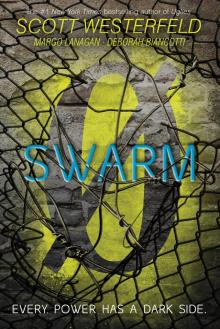 Swarm
Swarm Pretties
Pretties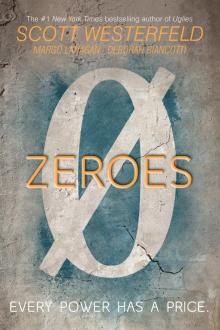 Zeroes
Zeroes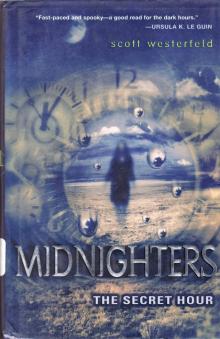 The Secret Hour
The Secret Hour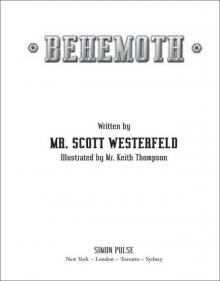 Behemoth
Behemoth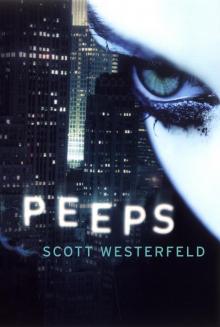 Peeps
Peeps Specials
Specials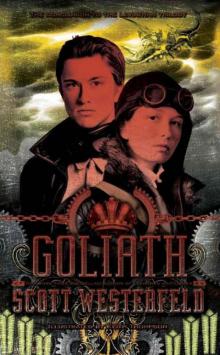 Goliath
Goliath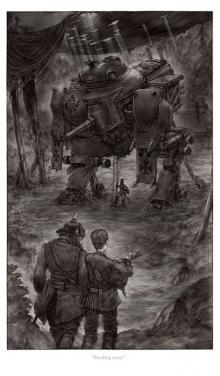 Leviathan
Leviathan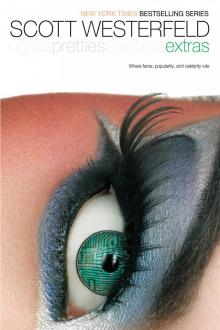 Extras
Extras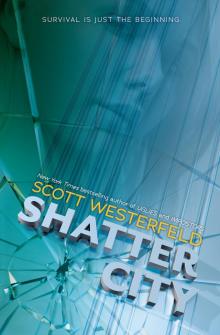 Shatter City
Shatter City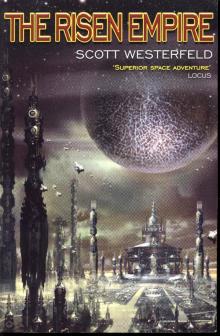 The Risen Empire
The Risen Empire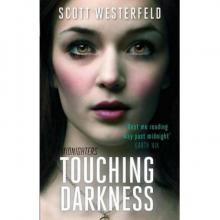 Touching Darkness
Touching Darkness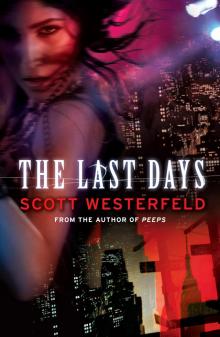 The Last Days
The Last Days So Yesterday
So Yesterday The Killing of Worlds
The Killing of Worlds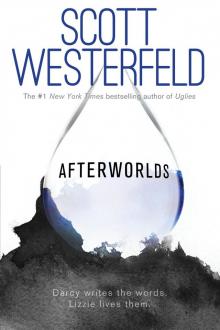 Afterworlds
Afterworlds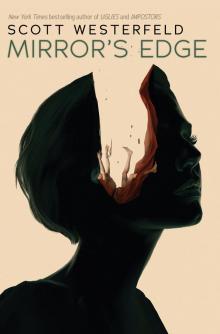 Mirror's Edge
Mirror's Edge Evolution's Darling
Evolution's Darling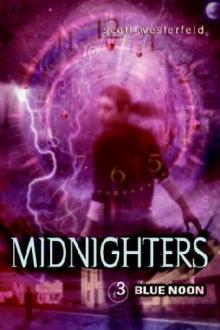 Blue Noon m-3
Blue Noon m-3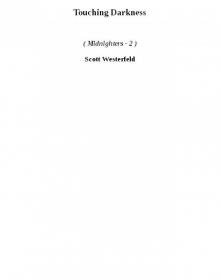 Touching Darkness m-2
Touching Darkness m-2 Impostors
Impostors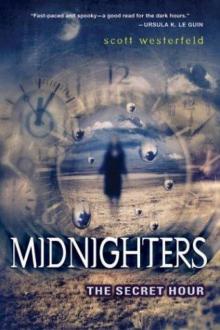 The Secret Hour m-1
The Secret Hour m-1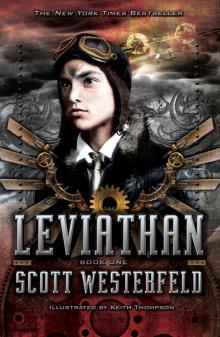 Leviathan 01 - Leviathan
Leviathan 01 - Leviathan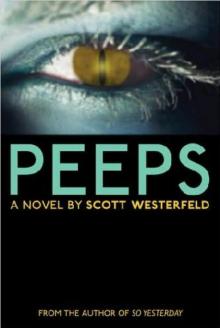 Peeps p-1
Peeps p-1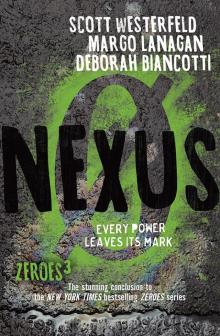 Nexus
Nexus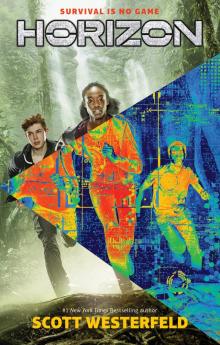 Horizon
Horizon Bogus to Bubbly
Bogus to Bubbly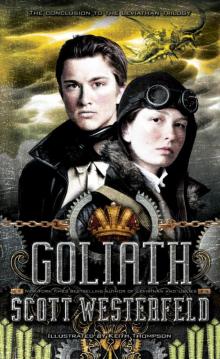 Goliath l-3
Goliath l-3 The Last Days p-2
The Last Days p-2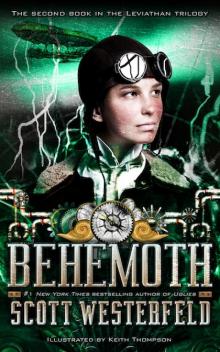 Behemoth l-2
Behemoth l-2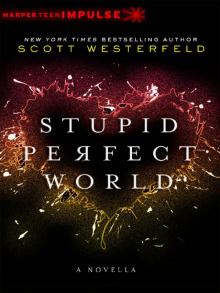 Stupid Perfect World
Stupid Perfect World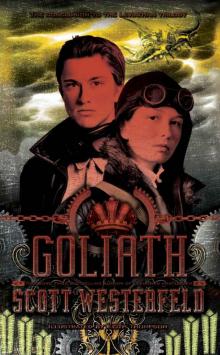 Goliath (Leviathan Trilogy)
Goliath (Leviathan Trilogy)